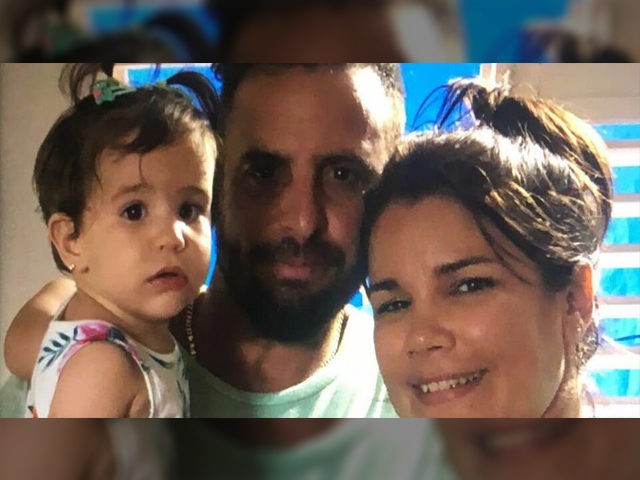The parents of a one-year-old girl who died after receiving a Measles, Mumps, and Rubella (MMR) vaccine in Havana, Cuba, last month fled the country, they revealed on Wednesday, after police threatened to arrest them if they kept publicly demanding answers.
Cuban authorities have not yet provided an explanation for why Paloma Domínguez Caballero died on October 9, but have dismissed the possibility of a flaw in the MMR vaccine that Domínguez received. Four other children also exhibited what the Cuban government called “adverse” reactions to the vaccine at the same medical center that Domínguez attended, the Betancourt Neninger government clinic.
Cuba’s second-in-command, “President” Miguel Díaz-Canel, posted a message mourning the use of Domínguez’s death for alleged “political” reasons.
The Cuban Communist Party has a record of murdering infants, most prominently six-month-old Helen Martínez Enríquez in what is now known as the 1994 “tugboat massacre.”
Mother Yaima Caballero launched an online campaign seeking justice for her daughter shortly after her death, requesting supporters share a photo of Paloma to raise awareness and pressure the communist regime to offer answers. She accused the regime of “killing” her daughter.
Now, Caballero confirmed to the independent Cuban outlet 14 y Medio that she and husband Osmany Domínguez Soler left the country for Mexico after authorities threatened her with prison time and expedited her passport application, a sign she took to mean the regime wanted her out of the country.
Caballero posted a photo on Twitter with her family on Wednesday, seemingly confirming their departure from Cuba.
“That is how everything works, it’s a shame, but nobody will shut me up,” she wrote.
Prior to posting the photo, Caballero said on the social media network that she had “nothing to lose” and would not stop demanding the regime answer for her daughter’s death.
“I was threatened with that if I kept making unfounded accusations, I was going to jail,” Caballero told the outlet, using the term Cuban state security agents used when describing her online campaign. “I had to leave the country because I don’t feel like shutting up.”
According to Caballero, the government requested a meeting with her and Domínguez, allegedly to update them on the investigation into their daughter’s death. Instead of offering any news, state security agents took the couple’s phones, interrogated them on deeply personal matters – “they asked me when my first menstruation was,” she noted – and threatened them with prison time.
“The whole time they kept saying that they knew about our social media posts,” Caballero told 14 y Medio, telling her that she had made “very grave and false accusations” against the government and that she could not accuse the regime of “killing” Paloma.
She replied by asking for the formal procedure to press charges for homicide “because what happened here is homicide … I don’t know who or what, but what I do know is that they killed my daughter.”
The Cuban communist regime uses several laws to imprison dissidents, most commonly the crime of desacato (“contempt” against the regime). Caballero says agents threatened her with criminal libel against the regime.
In separate remarks to the outlet Cubanet, Caballero said that neighbors had warned her for weeks that state security agents were monitoring her home before she decided to leave. She did not have a passport when she and her husband made plans to travel to Mexico, but her application took three days rather than the standard 20.
“Needless to say what that means,” she sighed to Cubanet.
“I can’t go back to Cuba, they made that clear, at least for now, but I already said everything that I had to say there, and here I will keep demanding justice for my daughter, Caballero said from Mexico.
The Cuban regime has in the past two years adopted forcible removal from Cuba as a strategy to silence critics of the regime. In at least two known cases, longtime dissidents have reported being kidnapped and put on airplanes without knowing their destinations, only to land in Guyana.
Daniel Llorente, an independent dissident known for flying the U.S. flag in protest of the regime, disappeared in May. He resurfaced in Georgetown, Guyana, telling Breitbart News that government agents repeatedly threatened him to leave Cuba and told him that, in the event he returned home, “we will disappear you.”
Caballero’s case is different in that she has no public record of political dissent prior to her daughter’s death, nor does her husband.
Caballero told Cubanet that she believes there was a chance Paloma could have survived her reaction to the vaccine, and that perhaps negligence killed her, necessitating her departure from the island.
“All this time has been useful for me to think, maybe she could have been saved,” she told Cubanet. “They left me all night alone with her getting worse and worse, and I was alone trying to lower her fever until 5 a.m. that they put her in [intensive] therapy because she was doing very badly. There was only a resident that walked by once in a while and he didn’t like what he saw, he told me he had to ask his professor.”
Paloma Domínguez did not have any known pre-existing medical conditions before she died. She lasted less than 72 hours after receiving the MMR vaccine.
The MMR vaccine is widely considered safe around the world and typically offered to children at the age of one. The U.S. Centers for Disease Control (CDC) state that the vaccine may be “life-threatening” to people with “serious immune system problems,” but there is no evidence that Domínguez was suffering any such condition.
The vaccine has been falsely linked to autism in developed states in the past, leading to outbreaks of Measles in places like California and New York. Measles virus is significantly more dangerous for children than the MMR vaccine.

COMMENTS
Please let us know if you're having issues with commenting.